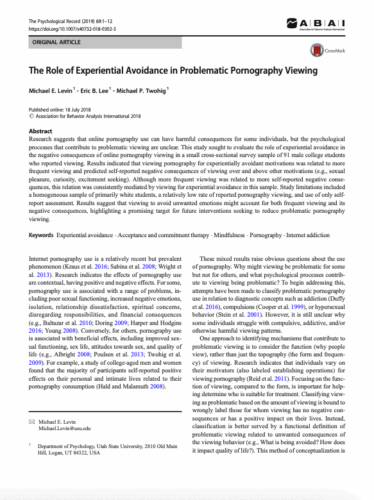Mental Health
The role of experiential avoidance in problematic pornography viewing.
Open Access: No.
Abstract
Research suggests that online pornography use can have harmful consequences for some individuals, but the psychological processes that contribute to problematic viewing are unclear. This study sought to evaluate the role of experiential avoidance in the negative consequences of online pornography viewing in a small cross-sectional survey sample of 91 male college students who reported viewing. Results indicated that viewing pornography for experientially avoidant motivations was related to more frequent viewing and predicted self-reported negative consequences of viewing over and above other motivations (e.g., sexual pleasure, curiosity, excitement seeking). Although more frequent viewing was related to more self-reported negative consequences, this relation was consistently mediated by viewing for experiential avoidance in this sample. Study limitations included a homogeneous sample of primarily white students, a relatively low rate of reported pornography viewing, and use of only self-report assessment. Results suggest that viewing to avoid unwanted emotions might account for both frequent viewing and its negative consequences, highlighting a promising target for future interventions seeking to reduce problematic pornography viewing.
Relevance
Experiential avoidance is a rigid and maladaptive pattern of behavior that attempts to escape from or suppress distressing and unwanted inner thoughts, emotions, and urges “despite the negative consequences that may arise from doing so.”
The results from this study showed that the “strongest and most constant predictor” of problematic pornography viewing was experiential avoidance.
Citation
Levin, M. E., Lee, E. B., & Twohig, M. P. (2019). The role of experiential avoidance in problematic pornography viewing. The Psychological Record, 69(1), 1–12. https://doi.org/10.1007/s40732-018-0302-3

